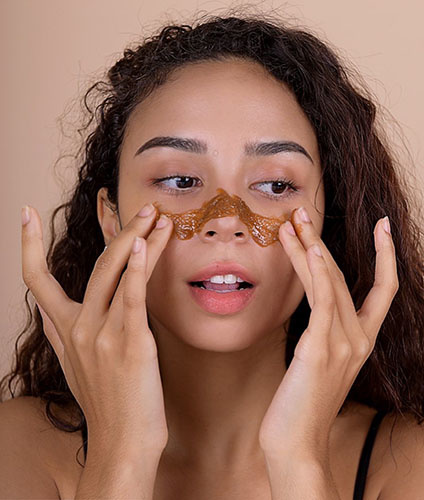Hi Little Wonderlanders,
As you know, exfoliation is the process of removing dead skin cells from epidermis (the outermost layer of your skin) using either physical or chemical exfoliants. There are certain advantages of a regular exfoliation, which we are going to explain below. But what happens to your skin when you exfoliate too often? How to not run a risk of over-exfoliation? We will answer these questions in this blog post!
Why to even bother to exfoliate?
Our skin goes through a natural process of renewal called cell turnover, during which newly produced skin cells replace the old ones. The older skin cells go through keratinization and die. They later are naturally sloughed away from the outer layer of skin upon the contact with environmental factors and because new skin cells push them out.
 | Skin cell turnover slows down with age, going from 28 days during teenage years and reaching 45-90 days after the age of 50. This means that it becomes easier for dead skin cells to build up and become a thick layer on the top of your skin, making it look dull and dehydrated. This can also cause a congestion of pores, leading to blackheads and whiteheads. Additionally, an excessive presence of dead skin cells makes it more difficult for your skincare products to penetrate and do their job. Hence, regular (not daily) exfoliation is important if you want your skin to be plump with an even glowing complexion. |
Physical & Chemical Exfoliation
There are two ways you can exfoliate your skin at home. Namely, by using either physical or chemical exfoliants. Physical exfoliation involves tools such as facial cleansing brushes and sponges or skincare products that contain exfoliating particles (such as face scrubs). Chemical exfoliation involves applying skincare products that contain exfoliating ingredients such as acids (AHA, BHA and PHA), enzymes and retinol. There are other forms of chemical exfoliants, but they are generally used in professional clinics or spas. Common chemical exfoliants found in skincare products are: glycolic acid (AHA), citric acid (AHA), salicylic acid (BHA), retinol (Vitamin A) and enzymes extracted from fruits like pineapple and pumpkin.
You may ask, which one of the two does the best job at exfoliating your skin? The answer to this is – it really depends on the product formula and your skin type. It can worthwhile to make a separate post that will guide you through the process of selecting a product that will work best for you, let us know in the comments if you would like that!
Having said this, it is still worth mentioning that both chemical and physical exfoliation are prone to user error. Meaning, people often disregard ‘how to use’ instructions, ingredient list and ignore unfavorable changes in their skin, which leads to more harm than benefit.
Factors contributing to the risk of over-exfoliation:
Here, we will list top factors that increase the risk of exfoliating too much in a hope that you, our dearest readers, will pay attention to them in your skincare routine:
- Choose exfoliating products according to your skin type
Selecting products from lines that aim to cure issues of your skin type is generally the way to go! If you are unsure about your choice - contact LW customer support for a piece of advice and we will gladly help you. This also brings us to the second point.
- Read the ingredient list.
There are plenty of educational materials in the internet about exfoliating ingredients and which skin types they are beneficial for. Use several sources and be critical about what you read. An educated choice will help you to avoid using products with a poor formulation. Tip: pay special attention to concentration of the acids mentioned in the ingredient list
- Do not exfoliate every day!
As a common rule, do not use exfoliating products more than 2-3 times per week. Observe how your skin reacts to exfoliation, as in the end, an optimal frequency of exfoliation is very much individual. We will list the symptoms of over-exfoliation in the latter section of this blog post.
- Exfoliate as a part of your p.m. skincare routine.
Exfoliation, especially a chemical one, does make your skin more susceptible to sun damage, which is why we recommend to exfoliate during your evening skincare routine and to, of course, use sunscreen the morning after.
- Be gentle when using an exfoliant.
Your skin should not turn red as a result of using face scrubs or cleansing brushes. Hence, gently massage a physical exfoliant over your face. Additionally, only use lukewarm water (not hot or cold water) to rinse your skin in order to prevent unnecessary stress. The second point concerns both physical (e.g scrubs) and chemical (e.g peeling gel) exfoliants. Go easy on your skin.
What can happen to your skin if you exfoliate too much?
Although a regular exfoliation will make your skin look healthy and radiant, overdoing it will pretty much do the opposite. Here are the signs that you have been too fanatical about exfoliating your skin:
|  |
What is the first thing to do if you realize that your skin is over-exfoliated? – Stop using exfoliating products until your skin is recovered. Give it a week or two or more, depending on the extent of the consequences, before you start exfoliating again (and don't do it as often as you used to!). Meanwhile, use products that will help your skin to recover. To restore and strengthen skin’s protective barrier you should go for products that contain super moisturizing and soothing ingredients. For example, Klairs Rich Moist Soothing Tencel Sheet Mask contains Aloe Vera Leaf Juice and Centella Asiatica extract, as well as Panthenol, Ceramides, Betaine, Hydrolyzed Lecithin and Allantoin to fill your skin with moisture, calm irritation and restore damaged skin.
Other products you can incorporate in your skincare routine in order to fix the aftermath of over-exfoliating are Aromatica Calendula Juicy Cream or Klairs Rich Moist Soothing Cream. These are a great pick for the over-exfoliated skin that suffers from extreme sensitivity. Both of these ultra-hydrating moisturizers do a great job of restoring skin’s protective barrier and soothing damaged skin.
Although a regular exfoliation is an important step to a beautiful skin, overdoing it can pretty much do the opposite and make it dull, dry and irritated. We hope that some points in this blog will motivate you to be more careful when it comes to selecting and using exfoliating products in your routine.
Till the next week!
LW Team xx







 Trending
Trending
 LW Blog
LW Blog










